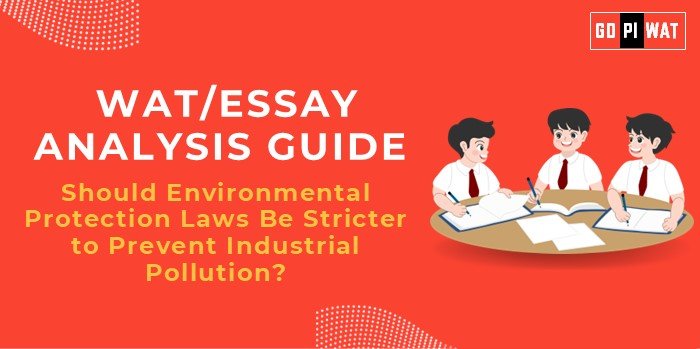📋 WAT Analysis Guide: Should Environmental Protection Laws Be Stricter to Prevent Industrial Pollution?
🌐 Understanding the Topic’s Importance
Stricter environmental laws serve as the foundation for sustainable development, ensuring ecological balance and reducing health costs. The discussion ties directly to policy-making, economics, and corporate responsibility.
🕒 Effective Planning and Writing
- Time Allocation:
- Planning: 5 minutes.
- Writing: 20 minutes.
- Review: 5 minutes.
- Word Count Distribution:
- Introduction: 70 words.
- Body: 350 words.
- Conclusion: 80 words.
✍️ Introduction Techniques for Essays
- Contrast Approach: “While industrialization drives economic progress, unchecked pollution threatens our planet’s survival. Stricter laws provide a bridge to balance these forces.”
- Solution-Based Approach: “Industries contribute to 24% of global emissions, but stricter laws can enforce greener practices and safeguard our future.”
📖 Structuring the Essay Body
- Achievements: Cite EU’s emissions reductions, India’s air quality goals.
- Challenges: Discuss enforcement gaps and economic implications.
- Future Outlook: Propose global collaboration and incentives for green technology.
📄 Concluding Effectively
- Balanced Perspective: “Stricter laws are essential but must include adaptive measures to support industries and communities.”
- Global Comparison: “Lessons from nations like Sweden and China showcase the viability of harmonizing economic growth with environmental conservation.”
📝 Sample Short Essays
Balanced Perspective:
“Industrial pollution needs robust regulations. However, a balanced approach incorporating economic incentives ensures industries comply while remaining competitive.”
Solution-Oriented:
“Implementing stricter laws with international collaboration can curb pollution and foster sustainable growth.”
Global Comparison:
“Adopting stricter laws akin to the EU’s emission policies can help India achieve its environmental goals without compromising growth.”


